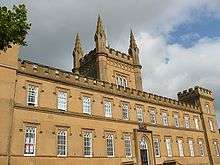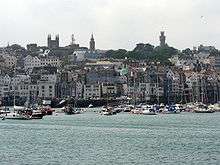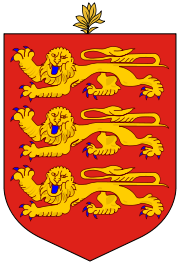Elizabeth College, Guernsey
| Elizabeth College | |
|---|---|
| Location | |
|
St Peter Port, Guernsey Channel Islands | |
| Coordinates | 49°27′22″N 2°32′24″W / 49.4560°N 2.5401°WCoordinates: 49°27′22″N 2°32′24″W / 49.4560°N 2.5401°W |
| Information | |
| Type | Secondary (11-18yrs) All-male, Junior and Pre-School (3-11yrs) Mixed |
| Motto | Semper Eadem (Always the Same) |
| Established | 1563 |
| Founder | Elizabeth I of England |
| Principal | George Hartley |
| Rival | Victoria College, Jersey |
| Website | http://www.elizabethcollege.gg |
 | |
Elizabeth College is a single sex, independent school in the town of St Peter Port, Guernsey. It was founded in 1563 under the orders of Queen Elizabeth I.[1]
History
Elizabeth College was founded in 1563 under the orders of Queen Elizabeth I. It was the fourth school to be established on the island; the others being the (loose) equivalent of primaries in St Peter Port, St Peter's and St Martin's.[1] The first schoolmaster was Belgian scholar Adrian Saravia, who went on to become one of the translators of the King James Bible. In order to create a site for the college, Franciscan friars were moved from their lands on La Rue Des Frères. The college still occupies this site. The college lands extended from College Street through the Grange all the way to Upland Road. However, the main college building of the time was the Cottage on the corner of the current campus, near to the top of Smith Street (Le Rue des Forges).[1]
Until the 19th century the school was poorly administered, and there was frequently only a very small number of pupils. In 1824 the governor of the island, Sir John Colborne, established a committee to perform a full review of the school.[1] By 1826 there was a new staff and a more complete curriculum, and the school was in a position to attract fee-paying pupils from England. On 19 October 1826 the foundation stone of a new building was laid, and the school was renamed as the Royal College of Elizabeth.[1] The building, which remains a prominent feature of the St Peter Port skyline, was designed by John Wilson,[2] who was also the architect of the French Halles, Castle Carey and the former Church of St James the Less.
The entire school was evacuated during World War II to Great Hucklow in Derbyshire as a result of the German occupation of the Channel Islands by Nazi Germany. Tradition says that a ghost of one of the Nazi soldiers walks the corridors at night. The tennis court at the front of the main school is built on the roof of a bunker that was built by the Germans, primarily as a secure holding area for weapons and ammunition.
Another once popular ghost story was that of a young boy (Wilson) who walks the corridors. This was known as Wilson's corridor and any new boy in the boarding house would be taken to the corridor by seniors and left there for a period of time as an initiation. There was indeed a cell at the far end of this corridor where boys would have been held as punishment in the 18th and 19th centuries. The wood panelled walls of this small room were covered with carvings and comments from those who had been held there. He was said to have been locked in detention, but then forgotten about during the summer holidays and subsequently starved to death.
The college also keeps records of every single pupil that has been taught there since 1824 in several volumes. In these are recorded their name, birth date and college number. The prestigious number "1" belongs to James Colborne (born 8 September 1815), later Baron Seaton.[3]
The associated Elizabeth College Junior School is located at Acorn House in King's Road (pre-school and pre-prep) and Beechwood (prep) in Queen's Road, St Peter Port.[4]
The 450th anniversary was 2013, and in May of that year, the new refectory on top of the old gym was opened to staff and pupils. This replaced the previous tuck shop in the old school gatehouse and provides a wide range of food throughout the day.
School site
The school is split into three main sections: the main school, a pre-prep school and a pre-school. The upper school is situated overlooking the town and harbour of St Peter Port. On separate sites, it has playing fields totalling roughly 69 acres (280,000 m2).[5]
Admissions

Elizabeth College has traditionally been a 'boys only' college. In the early 1990s, the college briefly admitted female pupils in the sixth form in order to cover the relocation of Blanchlande school. In 1999, a sixth form partnership arrangement was established with Ladies' College with shared teaching of AS and A2 lessons.
As an independent school, the majority of pupils are fee-paying; however the States of Guernsey awards scholarships annually on the basis of 11-plus results. Pupils of Beechwood, the junior school section of Elizabeth College, are not permitted to take the eleven plus, and therefore must be fee-paying pupils if they are to attend the college.
Elizabeth College is a selective school: all prospective pupils (from states schools or the junior school) must pass the entrance exam in order to be offered a place.[4]
Sport
The school has traditionally focused on three major sports (football, hockey and cricket): one in each of the three school terms. It has also been particularly successful in rifle shooting, regularly supplying members of the Athelings (British Cadet Rifle Team) as well as combining with Victoria College to form the Channel Islands rifle team.[6] This team has won the Cadet National match several times in recent years. The sport of fencing has recently grown in the college with the school now regularly sending a team to the annual public schools fencing championships and other domestic competitions.
The school also participated in many swimming galas, mainly competing with Victoria College, Jersey.[4]
Alumni
Since the 1820s, all pupils have been allocated a unique (sequential) school number. These are quoted below where known.
Victoria Cross recipientsThe college has four Victoria Cross holders among its former pupils:
Bailiffs of GuernseySee also: List of Bailiffs of Guernsey
The following Bailiffs of Guernsey were educated at Elizabeth College:
Members of British ParliamentAcademia
|
Arts
Media
Religion
Sports
Military personnel
Other
|
See also
- List of schools in Guernsey
- Upper Canada College, founded 1829 and modeled after Elizabeth College.
Notes
- 1 2 3 4 5 "History of Elizabeth College". Elizabeth College Website. Retrieved 17 February 2011.
- ↑ "The Liberation of Guernsey, May 1945". Imperial War Museum.
- ↑ Elizabeth College Register 1824-1873 published by Frederick Clarke 1898
- 1 2 3 Independent Schools Yearbook 2012-2013. A&C Black. p. 132.
- ↑ "Elizabeth College". Guide to Independent Schools. Retrieved 17 February 2011.
- ↑ "Norman excels and CI cadets repeat triumph". Guernsey Press. 15 July 2014.
- 1 2 3 4 5 "Elizabeth College Register 1824-1873".
- ↑ "The OE Memorial". The Old Elizabethan Association. Retrieved June 3, 2009.
References
- Elizabeth College Register, volumes I–IV
- A History of Elizabeth College, Guernsey by Bruce Parker. Published in 2011 by Third Millennium Publishing Limited . ISBN 978 1 906507 50 3
External links
- Elizabeth College website
- Old Elizabethan Association website
- History of Elizabeth College, Guernsey Museums website
